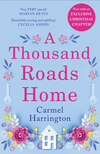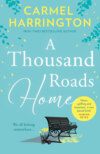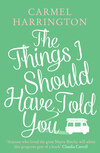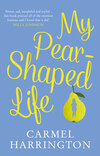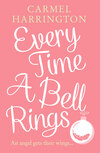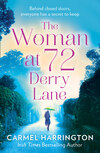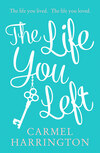Kitabı oku: «A Thousand Roads Home», sayfa 3
6
RUTH
Then
Ruth slipped a navy sleep mask over her eyes, smiling in satisfaction when her brother, Mark’s, small kitchen disappeared into darkness. Armed with her bowl of chopped fruit, she moved eight steps to the small dining-room table, which sat at the edge of the open-plan kitchen and living room. She had considered eating standing up, against the sink. But the thought was fleeting. One, her lower back ached and she needed the welcome relief of sitting. Two, more importantly, the sink was not the correct place to eat.
Ruth liked to do the correct thing. Follow the rules.
‘Sorry, little baby. Be patient,’ she whispered.
A third kick under her ribcage made her jump and elicited a loud bellowing laugh. ‘Not afraid to look for what you want, that’s my fierce little one.’ In delight, she rubbed her round tummy.
The baby responded by kicking her once again, its target the top of her pelvis. She lowered the bowl onto the table, ignoring the stabbing pain, then sat down. The relief was immediate. She felt her body celebrating the respite from hauling around the additional weight she now carried on her slight frame.
Reward for her efforts was immediate when Ruth popped a large slice of mango into her mouth. The sweet, tangy juice spilled from the soft flesh in an explosion that set her taste buds alight. She laughed out loud again as her jubilant baby began a victory dance, its craving for bright-orange mango fruit quenched. ‘If there is a sweeter taste, then I do not know it,’ she whispered to an empty room. But her little one answered, with another sharp kick to her ribs.
‘I will always do all in my power to give you what you want, little one,’ Ruth whispered to her unborn child.
Not everyone is cut out to be a mother.
Ruth stuck her tongue out to the voice of her mother, which loved to peck, peck, peck at her. If she could fulfil the wishes of her baby, even now, before it was born, maybe her mother was wrong.
Then a monstrous thought crept up on her, threatening to ruin what had been a perfect moment. Irrational fears about consuming food that was not white began to fill her head. What if she turned her breast milk orange, from all the mango juice she had been relishing? What if the baby decided that it did not want to drink her milk or formula? What if the baby only wanted juice? The mango syrup changed from a vibrant orange to blood red and her head began to pound. What if … what if … what if … Ruth felt dizzy with the unanswered dangers that were hidden in the what ifs of her mind. A familiar flip of panic turned her stomach upside down and as it grew stronger, feeding on her fear, it snaked its way around her insides, exploring her body, poisoning her.
She pushed the bowl of fruit away from her and stood up, taking off her mask.
Why must you always be so difficult?
It was no use. Her mother may not be here, in this flat, but she lived in her head and would not leave her alone.
‘Do you think the starving children of Africa get to choose the colour of their food? Oh, for pity’s sake, Ruth. You are trying my patience. Just EAT YOUR DINNER!’ Marian shouted to her ten-year-old daughter.
‘I am sorry, Mama, I am trying,’ Ruth whispered.
‘Yes you are. Very trying.’
Now she reached for a napkin and threw it over the discarded fruit in disgust. Her baby thought about protesting, even gave a small kick but, in a moment of solidarity, quietened down.
Sweat trickled from her forehead, sliding down her cheek, disappearing under her chin. She wiped it away with the back of her hand, feeling contaminated and shamed. Always just below the surface, ready to jump up at a moment’s notice, self-reproach returned. She was bad. She let people down. Shame, shame, shame.
Ruth lay her hands on her protruding tummy and felt love move between her and her baby. It was a tangible thing – an energy that was palpable. Had her mother ever felt that energy herself, when she carried Ruth in her tummy? Her memories said no. But maybe she remembered her childhood incorrectly. Was it possible that she had distorted her childhood into something ugly, something untrue? A confusion of dreams with reality. Maybe right now, her mother was in her childhood home, baking bread and smiling as she thought of her daughter and the grandchild that was soon to come to this world.
Sometimes Ruth thought her head would break into hundreds of pieces. Dangerous scenarios crashed around her skull. But even Ruth’s vivid imagination could not have predicted how far her mother would go to take her baby from her.
7
RUTH
Now
Ruth and DJ stood side by side in front of the small hotel. Painted in a garish canary yellow, it stood at the end of a small complex of shops. Ruth noted there was a café, a chemist, a newsagent and what looked like a beauty salon included in the row.
She looked to her left and then to her right and saw rows of red-brick semi-detached houses. Their driveways were in the main empty, waiting for their owners to return home from their working day.
‘Is that our hotel?’ DJ asked, disappointment lacing his words. His dream of a fun holiday hotel, with a swimming pool, maybe even a Jacuzzi, faded with every mediocre angle of the building in front of them.
‘Yes, it appears it is. The size would suggest that it is more a guesthouse than a hotel,’ Ruth noted.
‘The sign is crooked,’ DJ said, pointing to the blue wooden sign that said, ‘The Silver Sands Lodge’.
Ruth had noticed the lopsided sign the moment the taxi pulled up outside. If a ladder was in her eye line, she would have climbed up and straightened it. Instead she pointed to their surroundings.
‘They have put us in a hotel that is falling apart,’ Ruth said, looking at the fallen sign.
‘I don’t want to stay here!’ DJ raised his voice with deliberation. He wanted to upset Ruth. He wanted to cause her pain. Maybe that would stop him feeling so bad. Maybe that would keep the tears away.
‘We have no choice.’
‘I want to find my dad,’ DJ said, kicking the road with such ferocity that a haze of dust rose up to obscure him. He hoped this time the whole hotel collapsed in front of them.
‘You choose now, in this moment, to say that,’ Ruth said.
‘I want to know where he is,’ DJ repeated, knowing that his question was unfair. Knowing that Ruth could not answer him. But he was sick of being fair, of understanding, of helping. He was sick of it all.
‘I do not know where your father is. You know that,’ Ruth said, taken aback by her son’s outburst.
DJ ignored this statement and said, ‘He might be able to help. If we can find him. I want to find him.’
Ruth thought about DJ’s father. His large, round, earnest face only seconds away from laughter at any time. If we kiss, that will be it. That’s what he’d said. They had kissed, they had done a lot more than kiss, but it turned out that it wasn’t it, after all. Over the past ten years Ruth had gone over and over their last moments together. She believed him when he said he would be back. She had waited for him. She supposed she was still waiting.
‘Come on, it is time to check in. We shall talk about this another time,’ Ruth stated. She picked up her case and sack and began counting the steps to the front door.
One, two, three …
‘You always say that,’ DJ complained, but he followed her all the same.
… nine, ten, eleven …
This was wrong. There were twenty-eight from kerb to door at their old flat. Only eleven here. She took a step sideways. Twelve. Better, but not right.
DJ sighed, watching her.
A bell tinkled as they opened the double front door. Ruth wiped her feet and nudged DJ to do the same, trying to put the bothersome number twelve out of her head.
‘It’s dirtier than our shoes!’ DJ said, nodding down towards the doormat that had years of mud ingrained into it.
A woman looked up from her computer screen with interest and studied them both up and down, taking in their suitcases and black sacks.
‘Ruth and DJ Wilde?’ She smiled as she spoke, but it was without any real warmth.
‘Yes,’ Ruth said. She noted the woman’s name badge: ‘Erica’. The owner.
‘How did you know it was us?’ DJ asked, impressed by the woman’s correct assumption.
‘My guests don’t normally bring black sacks with them. Don’t just stand there, you’re making my entrance all cluttered up!’ Erica said. Then she tutted, loudly, in case they were in any doubt as to her distaste about their appearance.
Ruth and DJ moved in quickly without a word.
‘Now, as it’s your first day, I am making an allowance, letting you use our front entrance.’ She smiled as she informed them of her generosity.
‘I do not understand,’ Ruth said.
‘We have a side entrance reserved for our social housing residents,’ Erica explained.
DJ and Ruth looked at each other, confused.
‘That’s rule number one,’ Erica stated, ‘but it’s one I am most particular about.’
‘Excuse me?’ Ruth was still at a loss.
‘The front entrance is for our normal guests,’ the woman replied, her smile still in place, but her eyes narrowed.
Normal. That word again. How many times had Ruth heard people say that she was not ‘normal’, and here, once again, she had been labelled. There was no getting away from it.
‘But we are guests, too,’ Ruth stated.
‘Of course you are. But you must also know that you are different to our paying guests. It was my Billy’s idea to make an entrance just for you. It’s just down the lane to the left of the hotel. You’ll be far more comfortable using that.’
‘I am quite comfortable using this entrance,’ Ruth insisted.
‘Are we going to have an issue here?’ Erica’s voice was sharp now. All pretence of a smile gone.
Ruth and DJ shook their heads in unison. The thought of a park bench put paid to Ruth’s annoyance.
‘We might be safer using the side entrance anyhow,’ Ruth said. ‘Your sign looks like it is about to fall off. That is a health-and-safety issue.’
‘That blasted sign!’ Erica said with irritation. She beckoned them over to the front desk and turned a large red hardback book towards them. ‘Our register must be signed every night to let us know that you are in the hotel. If you would please do so now …’
Signatures were listed beside room numbers, day after day until they blurred into one big hot mess.
Ruth’s hand shook as she picked up the pen and added her autograph to the list of names. Big Brother is watching us.
‘We’ve placed a laminated list of all the rules in your room. They have been drawn up by the council and ourselves to help make your stay as comfortable and safe as possible.’ Erica’s voice had taken on a singsong quality that Ruth suspected she reserved for new guests like them.
‘Your curfew – that’s rule number five, by the way – states that you must return to the hotel by 11 p.m.,’ Erica continued.
‘Why?’ Ruth asked. She could not remember the last time she was out later than nine or ten, but that was not the point. To be dictated to like this felt intrusive.
‘For the convenience of our guests. It’s just better this way,’ Erica sighed, her patience growing thin.
DJ moved closer to his mam. The adventure of hotel living was wearing off and they hadn’t even seen their room yet.
‘Now, to your right is our restaurant. Breakfast is included in your room rate and I think you’ll be very happy with it. We have quite the reputation for our hot buffet. We do three types of eggs,’ Erica boasted. ‘Served between 7 a.m. and 9.30 a.m. We also have a bar, located next door to the restaurant. But residents are asked not to use these facilities after breakfast. The communal areas of the hotel are out of bounds, as they are reserved for our …’
Ruth cut in and finished her sentence, ‘… normal guests.’
Erica sensed trouble. ‘I suggest you read all the rules when you get to your room and if you have any further questions you can direct them to your housing officer in Parkgate.’
Erica walked past a lift near the lobby down a long dark corridor, to a second smaller lift. She pointed to a sign for the car park and said, ‘That’s where you will enter and leave the hotel from now on.’
The difference between the double-fronted entrance and this emergency fire exit was stark.
‘Are your normal guests allowed to use this entrance?’ Ruth asked, and DJ sniggered into her back.
Erica chose to ignore her and said, ‘Your room is on the first floor. All our social housing guests are there.’
They followed her into the small lift, dragging their luggage behind them. They each found a space in a different corner, the wait for the doors to close feeling like an eternity.
Ruth had never felt so claustrophobic in her life. Her hands were full so she couldn’t even pop to alleviate the pressure. She kept losing count of her steps because Erica would not shut up. Ninety-four. Yes. Ninety-four.
Once they got to the first floor Erica pointed to her right. ‘The communal kitchen is down there. It’s small, but I think you’ll find it has everything you need. Your room is at the other end of the corridor.’
Two kids, young boys that looked no more than four or five, came running around the corner onto the hallway at great speed. The looks on their faces as they slammed hard into Erica and Ruth were comical.
‘Hey, you two, watch it. You know the rules,’ Erica shouted at them both.
The two suitcases Ruth and DJ had been pulling along behind them fell to the floor with a thud.
‘Oh, shit,’ one of the boys said. DJ started to giggle, which made them both giggle even louder.
‘Sorry, ’Rica. Sorry, missus. Don’t go off on one,’ the taller of the two boys said, panting from his run. He offered them both his biggest smile, all teeth and a wrinkled-up nose, then grabbed his brother’s arm, pulling him out of the way so they could continue on theirs.
‘You don’t look one bit sorry, but you might be when I tell your mother about this!’ Erica’s words were lost on them. ‘Just slow down, lads. It would be good if we could all get to the end of the day without someone ending up in A&E!’
‘We will,’ the boys shouted back.
‘Oh, for goodness’ sake!’ Erica exclaimed, watching them take off again. She wiped a trickle of sweat that was making its way down the side of her face onto the back of her hand. ‘The heat in this place. I must talk to my Billy about the air conditioning.’
‘Carrying extra weight causes the body to work harder and could be at the root of your unwanted perspiration. It is only eight degrees outside after all,’ Ruth said.
‘I beg your pardon!’ Erica exclaimed.
Ruth replied, ‘I said, it is unlikely that the temperature outside is causing your perspiration issue.’
‘I know what you said!’ Erica said, then marched off down the corridor. DJ and Ruth picked up their cases and black sacks, then followed Erica’s retreating back once more. They weren’t heavy, but they were big and cumbersome. DJ’s little hands were red from his efforts. Yet he never complained, not once all day. Ruth was so proud of her boy and grateful she had listened to him when he insisted he stay with her.
Her eyes drifted downwards to their preferred position and DJ’s too-short jogger bottoms taunted her. Where was the nearest Penneys to here? One hundred steps already. Erica’s black Skechers shuffled their way over the busy red-and-gold carpet that was underfoot. It was showing signs of years of wear and tear. One hundred and nine. Parts of it were shiny from the thousands of feet that had walked on it, the edges beginning to fray. Ruth felt her head buzz as a ringing sound bounced its way between her two ears. It was making her cases feel heavier than they actually were, slowing her down. For a large woman, Erica moved at great speed. Ruth tried to focus on the retreating back of Erica and not give in to her dizzy spell.
One hundred and thirteen. Erica stopped in front of a white door that had a gold number, top centre. ‘Here we are. Room 129. Your new home. Had Parkgate called yesterday we would have had to turn you away. We’d a nice couple in this room until this morning. They fell on hard times and were a genuine case that needed help. Not like most of the wrong ’uns that we see in this place.’
‘We’re not wrong ’uns, Mam,’ DJ said.
‘No we are not,’ Ruth replied, then turned to ask Erica, ‘How long were that couple here for?’
‘About six months, I’d say. Not that long,’ Erica said.
Six months. Ruth felt DJ’s eyes on her. She could not bear to look at him, to see the reproach and fear that she knew would be there.
Erica placed the key card in the slot and smiled with satisfaction when the light turned green. ‘These can be buggers. The amount of times I’ve had to go back down to reception to reset the key. Don’t put your card in the same pocket as your phone. That’s my top tip. It wipes them, then makes them redundant.’
Ruth replied, ‘That is correct. Anything with an electromagnetic field transmitting from it, such as a mobile telephone or TV can cause a mag stripe to demagnetise.’
Erica’s mouth dropped open in surprise, making DJ laugh. Go, Mam!
‘However, due to the frequency of the problem you are encountering, it is instead more likely to be caused by the faulty encoding equipment. I would suggest your machine in reception needs a service,’ Ruth said, matter-of-factly.
Erica pushed the hotel-room door wide open and walked in, keeping her eyes on Ruth all the while. In realisation that her mouth was agape, she shut it quickly. ‘Well, I never. I’ll tell my Billy that. Maybe you’ve got something there. You’re full of surprises, aren’t you?’
DJ said, ‘My mam knows a lot of stuff.’
Ruth remained silent. If she was that clever she would not be standing in the doorway of a small hotel bedroom that was the only roof over her and her son. It felt like she had just been issued a prison sentence. But for what crime? Living?
‘Aw, that’s nice that your boy is so proud of you,’ Erica said.
DJ continued, ‘She can add up numbers in her head, better than a calculator.’
A thought struck Ruth that would be funny if it was not so tragic. The woman who is so good with numbers has now become one. A statistic. One of the many thousands homeless in Ireland.
‘Well, enough of our gabbing, go on in. Here you go, home sweet home,’ Erica said.
They looked into the tiny room, which looked like it belonged in the 1980s. Magnolia walls, heavy red-and-cream checked curtains, with matching duvet covers and pillow shams on twin beds, and pine furniture. The woman was wrong. This wasn’t home to Ruth. And it never would be.
8
TOM
Over the years Tom had moved around Dublin quite a bit but he kept finding his way back to Fairview Park. He liked its proximity to the sea. In fact, the twenty-hectare park was once part of the North Strand, reclaimed in the 1900s. During the day, he would sit on his park bench and listen to the sounds of the children playing in the distant playground. Their laughter and squeals of delight as they spun faster on a roundabout, or climbed one rung higher on the rope ladder, lifted his spirits. Bette Davis, his dog, his friend, liked to watch the kids do tricks in the skateboard park. They’d stop for a while and watch in awe. No fear, those kids. They would fly through the air, from ramp to ramp. Sometimes, in the amongst the noise of children having fun, he could hear Mikey.
His knee was aching again. He knew that one day soon he would have to get it looked at. His guess, which he reckoned was fairly accurate, was that the cartilage was gone. He’d walked more miles than he could even begin to hazard a guess over the past ten years. And it had caught up on him.
Sleeping rough in the cold winters doesn’t help either. He liked to ignore that voice in his head. It irked him because it spoke a lot of sense. And he wasn’t interested in sense. He liked his life the way it was, just fine. Out here. It was his choice.
He’d slept on the same bench every night since he took up residence in this park. And the Fairview Park regulars agreed that it was unofficially his. Lash and Bones, fellow rough sleepers, slept in the park most nights. And while they weren’t friends, it was nice sometimes to pass the time of day with them. Bones loved telling stories about Fairview’s most famous resident, Bram Stoker. The coastline beyond the park was eerie at night and it was easy to imagine, when the fog came down, how it had played a part in inspiring Stoker’s stories.
Tom sat down on his bench and Bette Davis fell asleep at his feet almost instantly. His sandwich was limp and uninspiring. But he wasn’t complaining. He’d had it in his rucksack since last night, when the volunteers from the Peter McVerry Trust did their rounds handing out food and hot drinks. He sat back, feeling every day of his sixty-one years. Bette had the right idea. Time for a nap. I’m coming, Cathy. He closed his eyes and remembered back to that first evening his wife and he had spent together …
Cathy rented a one-bedroom apartment that turned out to be only a mile or so away from Tom’s place. How had he lived so close to such an incredible woman and never seen her before?
He felt big and awkward in her small kitchen, bumping into her as he tried to help unload the groceries, on that first night they met. She told him to sit. He watched her fry their steaks and chop tomatoes for their salad, her every movement a symphony. Her grace bewitched him.
He wanted to know everything about her life. He couldn’t get the questions out quickly enough. She was from Donegal, one of three children, and a carer for adults with disabilities.
‘Tell me about your work. What’s an average day like?’ Tom asked.
‘We offer supportive services to help meet the needs of adults with disabilities.’
Tom looked at the tiny woman in wonder. He’d known her only a few hours yet she had surprised him several times in that short time. He couldn’t lie, it was a physical attraction at first. But the more she shared about herself, the more he found himself struck by her beauty, not just on the outside.
‘We’re there for help with both the physical and emotional wellbeing of our attendees and their families too. Parents and carers get a break, and the adults themselves keep some independence when they come in to us. In the main they return home each evening, relaxed. That’s crucial.’
‘I have a patient who is a full-time carer for her son. When I ask who looks after her, she just shrugs. I can’t get her to recognise the importance of having some time off, taking care of her own needs,’ Tom said.
‘There’s huge guilt for most carers. All self-imposed, but real none the less. You should tell your patient about our programme. We might be able to help. You can change the world by helping one person at a time. That’s what we try to do at the centre. One at a time,’ Cathy said.
Tom felt a lump in his throat, catching him unawares. Her words moved him profoundly. He would never forget that statement. Ever.
His appetite disappeared and it seemed hers did, too.
‘Maybe I should have bought tofu,’ Cathy joked, pointing to Tom’s uneaten steak.
‘I’m sorry. It’s delicious,’ Tom said, quickly spearing a piece to prove the point.
She reached over and her fingers brushed his and they both felt another jolt. ‘There’s no need.’
Their eyes locked. Time stood still. Cathy put her glass down, the crystal tinkling as it hit the glass top table. The sound bounced around the kitchen and his eyes could not leave hers. They moved to her bedroom and they made love. He could not call it anything but that. It was tender, every touch a promise.
‘I didn’t expect this,’ Cathy said afterwards, when they lay in each other’s arms.
‘Breda, my receptionist, is forever saying that I am one of Ireland’s most eligible bachelors. Sure you couldn’t resist,’ Tom teased.
‘She’s right. A good-looking man and a doctor. At least in the top one hundred,’ Cathy joked back.
‘Thank you, young lady.’ Tom pretended to tip his cap to her.
‘I bet patients fall in love with you all the time.’ She started to laugh when she saw him blush. ‘I knew it! Spill!’
‘Well, there was this woman last year who kept making appointments, saying she was unwell. Breda used to tease me that she had a crush on me. But I thought that was preposterous. Then one day, she came in with a bad chest infection.’
‘Oy oy! That old chestnut!’ Cathy laughed.
‘I remember thinking she was looking very well for someone who needed a doctor. Then before I had a chance to so much as take her temperature, she had her blouse unbuttoned.’
‘Her blouse,’ Cathy snorted in response. ‘How old was she?’
‘About thirty, why?’
‘No one wears a blouse under the age of fifty!’
‘Well, she opened her …’
‘Her top, just say top,’ Cathy advised.
‘She opened her top and had on this red lacy thing that left nothing to the imagination!’
‘Oh my goodness, I am scarlet for her! What did you do? Actually, scratch that question. I’m not sure I want to know.’
‘I jumped up and called Breda in. I told the woman that I had to have Breda in with me for any consultation that involved chest investigations.’
‘Ah, the poor woman.’
‘Poor woman my hat. Funnily enough, she stopped coming shortly after that.’
‘I bet she did!’ Cathy laughed again. ‘Go on, tell me more. How many hearts have you broken …?’
‘I’m afraid that’s it, really. I did meet one of my patients out in a bar last year. She was pretty drunk and she made a bit of a clumsy pass at me. I made a joke about being resolute to stay single. Then I ran home!’
‘Are you resolute to stay single?’ Cathy asked, leaning into him.
‘I’ve always been open to meeting Miss Right. She was just tricky to locate. No matter how many women I dated – all lovely, or at least most – I never felt “it”.’
He looked at her silhouetted against the fading evening light. And realised something. She was it.
‘So, what is “it” for you?’ Cathy asked.
‘“It” is that undeniable, unfathomable, unmistakable feeling of knowing that what you have is something special. I think “it” is you.’ He finished on a whisper.
‘Oh. That “it”,’ Cathy said, and they beamed at each other for the longest time.
The next evening, they moved to his flat above the surgery for a change of scenery. ‘It’s double the size of mine!’ Cathy said, walking from room to room.
‘I’ve the top half of the house. Downstairs is the surgery …’
‘Do you mind living above work?’ Cathy asked.
‘The commute is hard to beat.’
‘Are these your parents?’ She picked up a photograph of Tom in his graduation cap and gown, standing in between a couple who were bursting with pride.
‘Yeah. It was a good day. First in our family to graduate.’
‘Do you see much of them?’ Cathy asked.
‘They died last year, within a month of each other,’ Tom admitted sadly.
‘I’m so sorry,’ Cathy said, wishing she’d known him then to help him through the pain, which still lingered on his face.
‘My parents were obsessed with the idea of me settling down. They spoke about this subject often and at great length. They hung around until their eightieth and eighty-second birthdays respectively, before dying within weeks of each other.’
‘A proper love story.’ Cathy felt tears in her eyes.
And Tom and Cathy looked at each other and both silently wished for the same thing. A lifetime together, just like Tom’s parents had.
For a split second, when Tom woke up, he forgot. He reached across the cold pavement for Cathy. But she hadn’t been by his side for a long time. He gently stroked Bette Davis and wished for the one millionth time in his life that he could wake up and find happiness in the now, not just in the then of his dreams.
